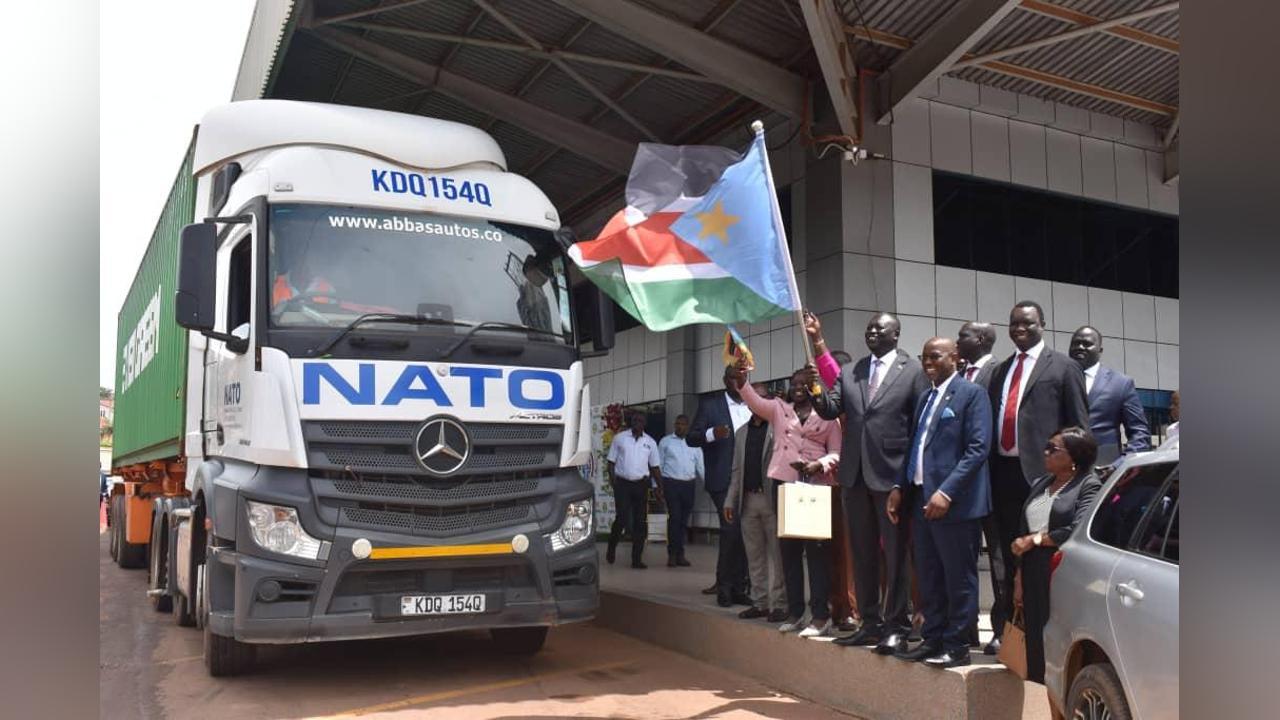Africa-Press – Uganda. On March, 28, 2025, the South Sudan Revenue Authority in conjunction with Uganda Revenue Authority jointly launched the South Sudan Regional Electronic Cargo Tracking system and the E- permit programs.
These are aimed at eliminating smuggling, ensuring security of cargo destined to South Sudan through real time monitoring, digitalizing and professionalizing cargo handling and enhancing revenue collection in the East African Community and South Sudan in general and facilitating legitimate trade.
The development manifested as a long-overdue breakthrough in modernising trade and customs processes of the World’s youngest nation, which has for generations battled chronic revenue leakage, rampant cargo diversion, weak enforcement tools, and gaps in border management.
Since the launch, the Uganda Revenue Authority is already registereing progress, reporting more than $17 million worth of shipments digitally tracked against $92 million still slipping through the old system
The Nile Post caught up with Madam Diing Majur, the Assistant Commissioner South Sudan Revenue Authority in Kampala to speak about the progress of the digital system
The e-permit system has stirred significant conversation, what exactly is the system and how does it work?
The e-permit system is a digital innovation that replaces manual import and transit permits with electronic authorization linked to real-time cargo tracking. Every truck destined for South Sudan receives a digital permit and a GPS-enabled electronic seal. Customs officials can then monitor the truck from departure to arrival. If it diverts, stops unexpectedly, or someone tampers with the seal, an alert is sent instantly.
Why did South Sudan find it important to introduce this system now?
Because manual systems had outlived their usefulness. We were losing enormous revenue to cargo diversion, round-tripping, and smuggling. South Sudan is one of Uganda’s largest trading partners, and with such volumes, we needed a modern system to ensure transparency, predictability, and security. The world has digitalised customs; South Sudan cannot remain an exception.
What benefits have you seen so far?
A lot. First, we now have visibility. Since March, we have tracked 2,730 consignments worth over USD 17 million through the e-permit system. This real-time monitoring helps us prevent diversion and improve revenue administration. Traders benefit too—cargo is safer, clearance is faster, and border delays are fewer. For Uganda and South Sudan, this strengthens one of the most important trade routes in East Africa.
But reports show that many trucks still cross without e-permits. Doesn’t that undermine the system?
It reveals the gaps that must be fixed—but it also shows why the system is necessary. Over 14,700 consignments—worth more than USD 92 million—crossed without e-permits due to exemption letters, inconsistent enforcement, and lack of clear exclusion criteria. Previously, such gaps were invisible. The system now exposes them, giving us the tools to address them.
Critics say the system is disjointed and rushed. How do you respond?
Resistance is normal. Kenya, Rwanda, and Ghana faced the same complaints when they introduced electronic cargo tracking. Today, those systems are global models. The loudest critics are those who benefitted from the old manual loopholes. Some have sponsored smear campaigns to sabotage the reform. But national interest will prevail over individual interests.
How does this affect Uganda–South Sudan trade?
Positively. Uganda exports more goods to South Sudan than to any other country in the region—nearly 80% of its regional exports. Securing this corridor benefits both nations. The e-permit system makes trade safer, faster, and more predictable. It aligns us with the East African Community’s digital standards and unlocks investor confidence.
What is the government’s long-term plan for the system?
To strengthen it, refine it, and fully integrate it. We’re working with URA to harmonise policies, train clearing agents, and close loopholes. South Sudan is committed to digitalising its trade infrastructure. This system is here to stay.
Your final word?
Diing: South Sudan will stop at nothing to ensure the e-permit system works. The future of our revenue, our regional trade, and our economic security depends on it. Digital transparency is not just a reform—it is our path to national stability.
Source: Nilepost News
For More News And Analysis About Uganda Follow Africa-Press






